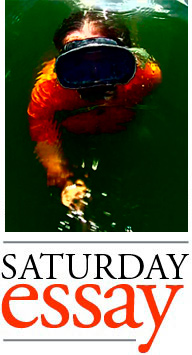Bob Dylan on Duluth and Minnesota
 Some Duluthians think Bob Dylan hates Duluth and Minnesota. What has Bob Dylan actually said?
Some Duluthians think Bob Dylan hates Duluth and Minnesota. What has Bob Dylan actually said?
I’d heard rumors Dylan was a Duluth hater, but then I read the liner notes to his 1974 album Planet Waves, where he wrote: “Duluth! Duluth — where Baudelaire Lived/& Goya cashed in his Chips, where Joshua brought/the house down!” These are not the words of someone who hates Duluth. These words lionize the city in terms of literature and mythology. A song on the album mentions Duluth too. From “Something There is About You“: “Thought I’d shaken the wonder/And the phantoms of my youth/Rainy days on the great lakes/Walkin’ the hills of old Duluth.” Duluth as a city of wonder and phantoms: who among us cannot relate?
Growing up in Hibbing, Dylan had family in Duluth and Superior. As a teen he went to Minneapolis more and more, and that became his jumping-off point to the world. But the Northland never left him. From his autobiography Chronicles, Volume One (2004 edition), one reads many references to Duluth, Hibbing, Minneapolis, and Minnesota as a whole.
On page nine, about weathering his first winter in New York City: “… but I’d started out from the frostbitten North Country, a little corner of the earth where the dark frozen woods and icy roads didn’t faze me. I could transcend the limitations.” Being from northern Minnesota provided him with a cold-adaptation that came in handy when he was hard-scrabbling around. On page 22, he refers to that New York winter as “ice-chopping weather” which is something he never would have said if he wasn’t from up here. On page 26, again about that NY winter he writes, “The air was bitter cold, always below zero, but the fire in my mind was never out.” He brought that metaphorical fire from Minnesota. On p. 32 he says of the NY winter, “A blizzard was kidnapping the city, life spinning around on a drab canvas. Icy and cold.” It was a part of him.
Page 14, on his affinity with similarly-aged child star Ricky Nelson: “It was like he’d been born and raised on Walden Pond where everything was hunky-dory, and I’d come out of the dark demonic woods, same forest, just a different way of looking at things.” I interpret this broadly to mean Hibbing wasn’t a great place to grow up for a weirdo in the 1950s. Any Minnesotan resenting Dylan for leaving has to grapple with this fact. 1950s Hibbing was among the squarest places on Earth.
Page 31: The reference to trains in his “home town” below means Hibbing, but Duluth is also a chooch town, and the reference to his “earliest childhood days” is a Duluth reference: “I’d seen and heard trains from my earliest childhood days and the sight and sound of them always made me feel secure. The big boxcars, the iron ore cars, freight cars, passenger cars, Pullman cars. There was no place you could go in my hometown without at least some part of the day having to stop at intersections and wait for the long trains to pass. Tracks crossed the rural roads and ran alongside them as well. The sound of trains off in the distance more or less made me feel at home, like nothing was missing, like I was at some level place, never in any significant danger and that everything was fitting together.”
Page 49, on Judy Garland’s Minnesota roots: “Judy Garland was from Grand Rapids, Minnesota, a town about twenty miles away from where I came from. Listening to Judy was like listening to the girl next door.” From Garland’s example if nothing else, Dylan knew you could be from Minnesota and hit the big time. If the girl next door could do it, so could he. But the journey required leaving: “When I left home, I was like Columbus going off into the desolate Atlantic” (p. 108). On pp. 257-258, talking about leaving Minnesota for the world of “Jack Elliott and Joan Baez,” he writes, “I, too, had the axe in my hands and needed to tear out of there, head off to where life promised something more — felt that my own voice and guitar would be equal to the situation.” In other words, he left because his destiny was elsewhere.
There is a marvelous and deeply personal passage on pp. 92-93 about his Duluth grandmother. Talking in Greenwich Village with his friend Ray Goonch sparked his memory: “Once he said that President Kennedy wouldn’t last out his term because he was a Catholic. When he said it, it made me think about my grandmother, who said to me the Pope is the king of the Jews. She lived back in Duluth on the top floor of a duplex on 5th Street. From a window in the back room you could see Lake Superior, ominous and foreboding, iron bulk freighters and barges off in the distance, the sound of foghorns to the right and left. My grandmother had one leg and had become a seamstress. Sometimes on weekends my parents would drive down from the Iron Range to Duluth and drop me off at her place for a couple of days. She was a dark lady, smoked a pipe. The other side of my family was more light-skinned and fair. My grandmother’s voice possessed a haunting accent — face always set in a half-despairing expression. Life for her hadn’t been easy. She’d come to America from Odessa, a seaport town in southern Russia. It was a town not unlike Duluth, the same kind of temperament, climate and landscape and right on the edge of a big body of water.”
Starting on page 229, there are many pages about the Duluth area and his family which I encourage you to read. Including page 230 where he writes, “Near Duluth, I also had cousins across the suspension aerial bridge in Superior, Wisconsin, the notorious red-light, gambling town.”
On the same page, he writes: “What I recall mostly about Duluth are the slate gray skies and the mysterious foghorns, violent storms that always seemed to be coming straight at you and merciless howling winds off the black mysterious lake with treacherous ten-foot waves. People said that having to go out onto the deep water was like a death sentence. Most of Duluth was on a slant. Nothing is level there. The town is built on the side of a steep hill, and you’re always either hiking up or down.” This passage is followed with a specific strong memory of being taken at a young age to see Truman speak at Leif Erikson Park: “It’s amazing how I can still feel it.”
Speaking specifically about Hibbing, Dylan describes growing up in northern Minnesota on pp. 231-232. Differentiating between his mother’s generation and his own, he writes: “The world I grew up in was a little different, a little more modernized, but still mostly gravel roads, marshlands, hills of ice, steep skylines of trees on the outskirts of town, thick forests, pristine lakes large and small, iron mine pits, trains and one-lane highways. Winters, ten below with a twenty below wind-chill factor were common, thawing spring and hot, steamy summers — penetrating sun and balmy weather where temperatures rose over one hundred degrees. Summers were filled with mosquitoes that could bite through your boots — winters with blizzards that could freeze a man dead. There were glorious autumns as well. Mostly what I did was bide my time. I always knew there was a bigger world out there but the one I was in at the time was all right, too.”
On pages 240-241 he writes, “Highway 61, the main thoroughfare of the country blues, begins about where I came from … Duluth to be exact. I always felt like I’d started on it, always had been on it and could go anywhere from it, even down into the deep Delta country. It was the same road, full of the same contradictions, the same one-horse towns, the same spiritual ancestors. The Mississippi River, the bloodstream of the blues, also starts up from my neck of the woods. I was never too far away from any of it. It was my place in the universe, always felt like it was in my blood.”
There’s more but just go read it. Near the end of the book (pp. 291-292) he speaks of his pride in being from Minnesota: “I didn’t follow baseball that much but I did know that Roger Maris who was with the Yankees was in the process of breaking Babe Ruth’s home-run record and that meant something. Maris was from Hibbing, Minnesota, of all places. Of course, I never heard of him there, nobody did. I was hearing a lot about him now, though, and so was the rest of the land. On some level I guess I took pride in being from the same town. There were other Minnesotans, too, that I felt akin to. Charles Lindbergh, the first aviator to fly nonstop across the Atlantic in the ‘20s. He was from Little Falls. F. Scott Fitzgerald, a descendant of Francis Scott Key, who wrote the words to “The Star-Spangled Banner,” and who himself wrote The Great Gatsby, was from St. Paul. Fitzgerald was called “the prophet of the jazz age.” Sinclair Lewis has won the Nobel Prize for Literature, the first American to do so. Lewis had written Elmer Gantry and was the master of absolute realism, had invented it. He was from Sauk Center, Minnesota. And then there was Eddie Cochran, one of the early rock-and-roll geniuses who was from Albert Lee, Minnesota. Native sons — adventurers, prophets, writers and musicians. They were all from the North Country. Each one followed their own vision, didn’t care what the pictures showed. Each one of them would have understood what my inarticulate dreams were about. I felt like I was one of them or all of them put together.”
Bob Dylan does not hate Duluth or Minnesota. In fact he has a keen understanding of what makes the place so extraordinary, extraordinary enough to immortalize in song. He is Duluth’s greatest son. Love him or hate him, no other Duluthian you care to name has made such a cultural impact. Who even comes close? Jay Cooke? What Minnesotan has achieved more — Walter Mondale? Are you even listening to yourself?
Prince, if he had lived as long as Dylan, could have pulled closer without question. But as George Harrison said — referring to rock n’ roll as a whole — “Dylan upstages everybody.”
I understand that all idols must be overthrown. But stop hating on Bob Dylan long enough to feel pride that our city, our county, and our state produced this preeminent, towering figure in the global history of music.
An index of Jim Richardson’s essays may be found here.
Recommended Links:
Leave a Comment
Only registered members can post a comment , Login / Register Here














3 Comments
accipiterbuteo
about 8 months agolager_man
about 8 months agoJim Richardson (aka Lake Superior Aquaman)
about 8 months ago